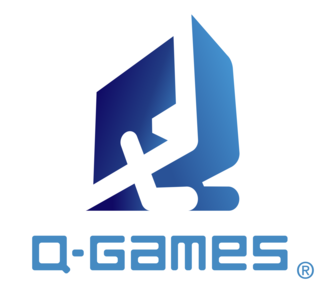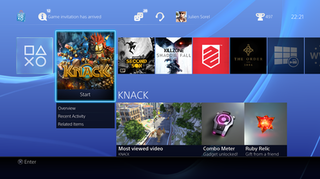
Sony Interactive Entertainment LLC (SIE) is an American multinational video game and digital entertainment company of Sony. Jointly established by two subsidiaries in 2016, it primarily operates the PlayStation brand of video game consoles and products. It is also the world's largest company in the video game industry based on its equity investments.
PlayStation Network (PSN) is a digital media entertainment service provided by Sony Interactive Entertainment. Launched in November 2006, PSN was originally conceived for the PlayStation video game consoles, but soon extended to encompass smartphones, tablets, Blu-ray players and high-definition televisions. It succeeded Sony Entertainment Network in 2015 and this service is the account for PlayStation consoles, accounts can store games and other content.

Q-Games, Limited is a video game developer based in Nakagyō-ku, Kyoto, Japan which works closely with both Nintendo and Sony.
PlayStation is a video gaming brand that consists of five home video game consoles, two handhelds, a media center, and a smartphone, as well as an online service and multiple magazines. The brand is produced by Sony Interactive Entertainment, a division of Sony.
Japan Studio was a Japanese video game developer based in Tokyo. A first-party studio for Sony Interactive Entertainment, it was best known for the Ape Escape, LocoRoco, Patapon, Gravity Rush, and Knack series, the Team Ico games, Bloodborne, The Legend of Dragoon, and Astro's Playroom. In April 2021, Japan Studio was reorganized and merged with Team Asobi and other SIE studios.

The PlayStation Vita is a handheld game console developed and marketed by Sony Interactive Entertainment. It was first released in Japan on December 17, 2011, and in North America, Europe, and other international territories beginning on February 22, 2012. The console is the successor to the PlayStation Portable, and a part of the PlayStation brand of gaming devices; as part of the eighth generation of video game consoles, it primarily competed with the Nintendo 3DS.
Sony has released a number of previously released PlayStation video games, remastered in high-definition (HD) for their newer consoles, a form of porting. A number of related programs exist, the most prominent two being "Classics HD" and "PSP Remasters". The former consists of multiple PlayStation 2 games compiled on one Blu-ray Disc. The latter are individual PlayStation Portable games republished on Blu-ray. These games are not direct ports, but remastered versions in high-definition, to take advantage of the newer consoles' capabilities. The remastering of the games include updated graphics, new textures, and Trophy support, and some of the remastered games released on PlayStation 3 have included 3D and PlayStation Move support. Some HD remasters have also been released individually or in bundles as downloads on the PlayStation Store; others are released exclusively as downloads.

PixelJunk Shooter 2 is a multidirectional shooter developed by Q-Games for the PlayStation 3. It is the sequel to PixelJunk Shooter and was released on the PlayStation Store in March 2011. PixelJunk Shooter 2 was formally announced by Q-Games on 18 May 2010. The title is the first sequel to any PixelJunk game.

The PlayStation 4 (PS4) is a home video game console developed by Sony Interactive Entertainment. Announced as the successor to the PlayStation 3 in February 2013, it was launched on November 15, 2013, in North America, November 29, 2013, in Europe, South America, and Australia, and on February 22, 2014, in Japan. A console of the eighth generation, it competes with Microsoft's Xbox One and Nintendo's Wii U and Switch.

The Unfinished Swan is an adventure video game developed by Santa Monica Studio and Giant Sparrow and published by Sony Computer Entertainment for the PlayStation 3 in October 2012. The game starts with a completely white space in which the player, a boy named Monroe, is chasing after a swan that has escaped a painting, while simultaneously learning the story of a lonely king. The PlayStation 4 and PlayStation Vita versions of the game, which was developed by Armature Studio, was released in October 2014. The game was released on Microsoft Windows and iOS by Annapurna Interactive in September 2020.
2017 saw the release of numerous video games as well as other developments in the video game industry. The Nintendo Switch console was released in 2017, which sold more than 14 million units by the end of the year, exceeding the under-performing Wii U lifetime sales. This has helped to revitalize Nintendo, with the "retro" Super NES Classic Edition console, the refreshed New Nintendo 2DS XL handheld and a strategy for mobile gaming. Microsoft also released the higher-powered Xbox One X targeted for 4K resolutions and virtual reality support.

The PlayStation 4 system software is the updatable firmware and operating system of the PlayStation 4. The operating system is Orbis OS, based on FreeBSD 9.
PlayStation Now was a standalone video game subscription service on consoles developed by Sony Interactive Entertainment. The service offered cloud gaming for PlayStation 2, PlayStation 3, and PlayStation 4 games that could be played on PlayStation 4, PlayStation 5 and Microsoft Windows computers. In addition, PlayStation 2, and PlayStation 4 games could be downloaded to play locally on PlayStation 4 and PlayStation 5. With the expansion of the PlayStation Plus service to offer additional tiers in May–June 2022, the standalone PlayStation Now subscription was shut down, but its services were incorporated into the PlayStation Plus Premium tier.






